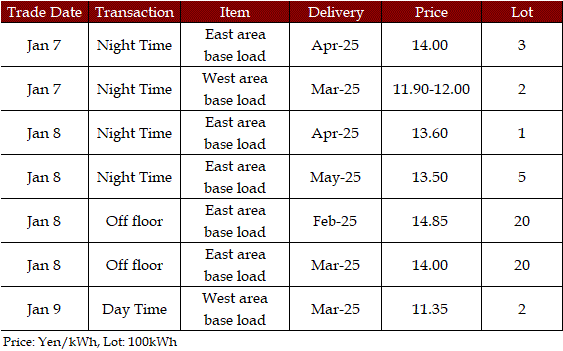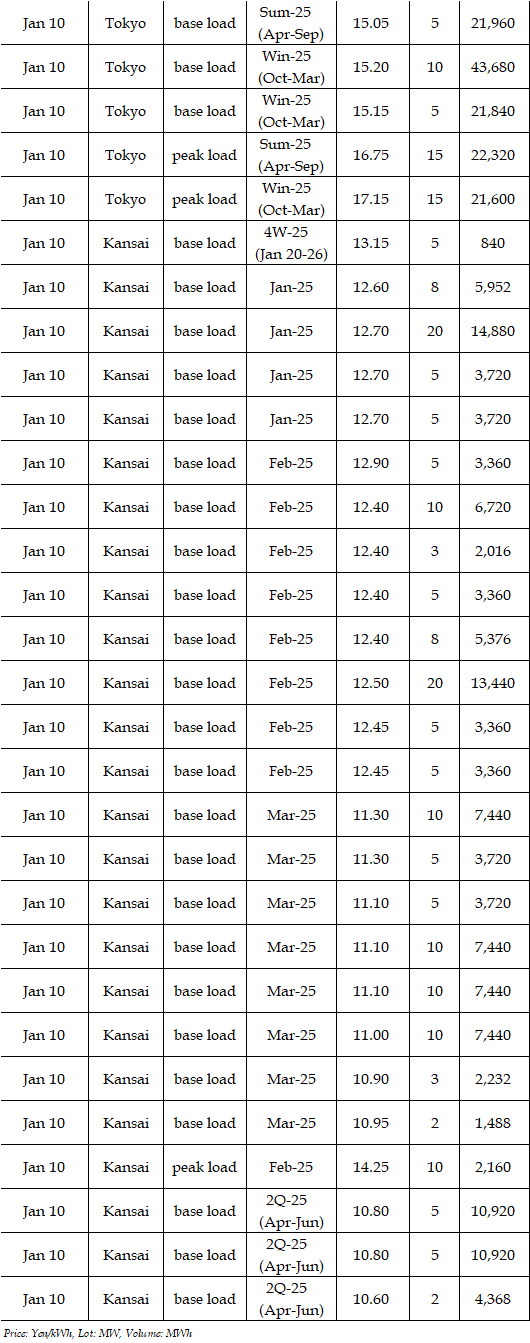|
In the day-ahead market on JEPX (Japan Electric Power Exchange), the 24-hour spot power prices on a weekly average basis for Jan 6-10 delivery stood in the mid $15 level in East Japan (50Hz) and the high Yen 14 level in West Japan (60Hz). But in the latter half of the week, West Japan outperformed East Japan for Jan 9 and Jan 10 delivery. A cold wave was expected to grip West Japan, and growing buying interest lifted spot prices. A source at a power producer and supplier said, "In West Japan, only a limited number of players are hedged for peak load (08:00-20:00 hours), so that unexpected chilly weather can easily boost buying interest during the time zone. Especially, spot prices have a tendency to mark highs in early morning hours when demand begins to pick up and evening onward when solar power supply shrinks.
In Tokyo and Kansai, the key areas in East Japan and West Japan, the 24-hour average posted a difference in favor of the East by Yen 2.31 for Jan 6 delivery, Yen 1.84 for Jan 7 delivery, and Yen 1.34 for Jan 8 delivery. But West Japan outperformed by East Japan by Yen 0.76 for Jan 9 delivery and Yen 0.66 for Jan 10 delivery.
The fuel market trends in the second week of January were detailed as follows.
DES Northeast Asia spot LNG prices hovered at $14 per mmBtu for prompt February 2025 arrival as of Jan 9. LNG prices lacked upward momentum as European natural gas prices softened on top of an unabated looseness in supply-demand fundamentals in Northeast Asia. The Ministry of Economy, Trade and Industry (METI) announced on Jan 8 that Japan's LNG inventories for power generation stood at 1.87 mil mt as of Jan 5, down 370,000mt from a week before. The figure was far below 2.70 mil mt as of end-December last year and the average of past five years at 2.16 mil mt. A source at the Agency for Natural Resources and Energy said, "The hefty fall in inventories came as only a small number of LNG tankers arrived in Japan during the year-end/new year period." More LNG cargoes are being received from the beginning of the new year, so that there seems to be little concern over inventory shortfalls.
FOB Newcastle thermal coal prices in Australia stood in the high $115 level per ton for January 2025 loading as of Jan 9. Coal prices continued to track a downward trend after the Christmas holiday.
In the crude oil market, WTI crude for February 2025 stood in the mid $74 level per barrel as of the afternoon on Jan 10 while Brent crude for March 2025 was trading in the mid $77 level. Crude prices continued to track an upward trend since the end of last year, finding support from growing demand for heating oil amid looming cold snaps in Europe and US.
The actual highest price during the week was at Yen 28.00 in six areas in West Japan for Jan 9 delivery. Meanwhile, the actual lowest price during the week was at Yen 0.01 in Shikoku for Jan 10 delivery.
By area, the weekly average of the 24-hour spot prices was at Yen 15.53 in Hokkaido, Yen 15.27 in Tohoku, Yen 15.42 in Tokyo, Yen 15.83 in Chubu, Yen 14.62 in Hokuriku, Yen 14.60 in Kansai and Chugoku, Yen 12.94 in Shikoku, and Yen 13.52 in Kyushu.
In the JEPX auction, volumes of offers were 1,194.22 mil kWh on a weekly average basis. Meanwhile, bids on a weekly average basis were 1,067.92 mil kWh. The weekly average of trade volumes was 844.51 mil kWh.
Power demand in nine areas of Japan during Jan 6-10 was a combined 14,302.81 mil kWh. Demand during Jan 8-12, 2024 after day of week adjustment was 13,675.46 mil kWh.
Deals reported on TOCOM (Tokyo Commodity Exchange) during Jan 6-10 were as below.

Deals reported on EEX (European Energy Exchange) during Jan 6-10 were as below.








In the third week of January, spot prices are believed to have limited upside potential compared with the second week. At the beginning of the week, the weather is forecast to be rather cloudy across Japan. But the temperatures will stay relatively high, and a slowdown in heating demand is likely to give a negative impact on spot prices. From the mid-week onward, sunshine will be available except in North Japan and Hokuriku, so that a growth in solar power supply is expected to put a lid on midday prices. Despite that, the temperatures will be lower than the first half of the week, and spot prices are believed to chase upside in early morning hours and evening onward with thin solar power supply. Still, most players doubt if the intraday high in spot prices will rise way above the Yen 20 level. A source at a power producer and supplier said, "In both East Japan and West Japan, the 24-hour average will be capped around Yen 15."
|
JEPX: System Price (Day Ahead 24 hours)
|
|
Weekday Price
|
6-Jan
|
7-Jan
|
8-Jan
|
9-Jan
|
10-Jan
|
|
24-Hour Ave
|
14.42
|
13.41
|
13.98
|
16.12
|
16.29
|
|
Volume (MWh)
|
807,123
|
829,058
|
845,570
|
860,492
|
880,301
|
|
(unit: yen per kWh) (date: delivery day)
|
|
|

|